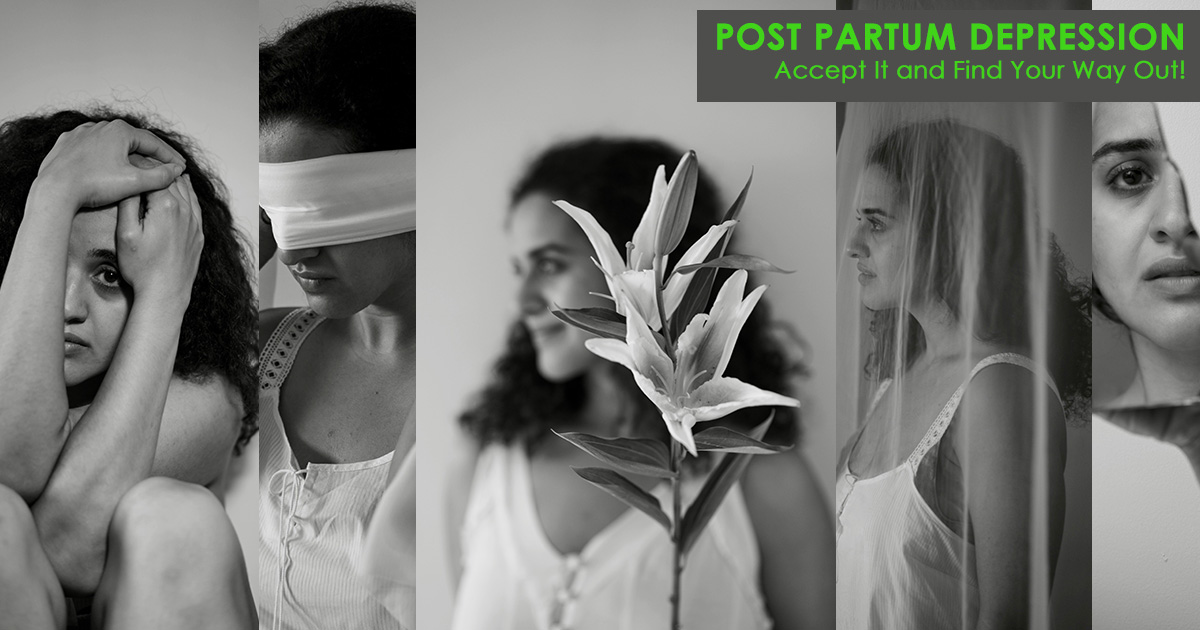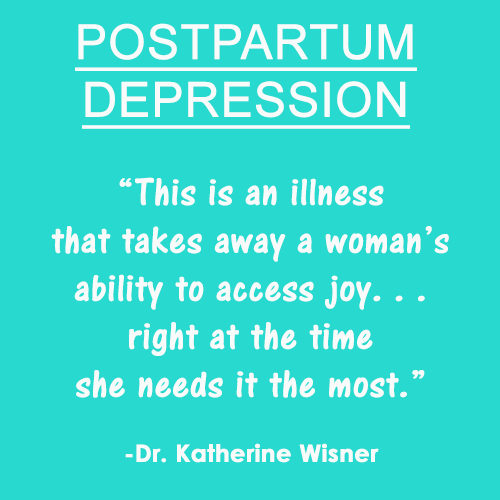Do you know the biggest reason why women don’t talk about their postpartum depression? Because they think it is shameful to admit that they are having mixed feelings about being a mom, instead of feeling blessed after having a baby!Makes sense, doesn’t it? You went through a blissful pregnancy waiting to feel drenched in love at the sight of your baby. But when the baby arrives, you think you probably made a mistake. None of that love seems to be in sight. No, you are not a bad mom! You are battling depression – a serious disease! And finally, there is help for Indian moms to deal effectively with postpartum depression.

Accept PPD
Accepting that you have PPD (Postpartum Depression) is the first step towards recovery. Unable to come out of the stage of denial, a young mom Sneha lost her life to PPD. In a resolve to not let any other mom feel so helpless, Trijog – Know Your Mind and Insaniyat have come together to launch ‘Sneha – A Ray of Hope’, a campaign towards recognizing Postpartum Depression in India.
Coming out from the dark early stages of PPD namely Denial, Anger, Bargaining and Depression, with proper help, new moms can make their way to Acceptance and Recovery. Social taboos and norms in India make it even more difficult for moms to open up about their feelings. Finding an ear to communicate your innermost thoughts and fears is the first step towards battling depression.
Reach out #DialYourDepression #TalkWithTrijog at http://trijog.com/ppdepression.html.
You Are Not Alone
The mom next door might keep mum about her situation making you believe that something is wrong with you. But that is not true at all. 2 out of 10 Indian women are at the risk of depression. Like in every other situation, Indian women have mastered the art of keeping mum about postpartum depression also. But from celebrity moms worldwide to Indian celebs like Mandira Bedi, these star moms had the courage to confess and confront their postpartum depression.. Their only motive behind doing this is to lessen the stigma associated with it.
Symptoms of Postpartum Depression to Look Out For
PPD can be confused with Baby Blues but the two are very different. I had a case of baby blues and it took me a while to figure out that this wasn’t the dreaded PPD. Hormonal changes after childbirth, increased stress and lack of sleep lead to baby blues in up to 80% of women. It is a temporary condition and lasts from a few hours to 15 days. In most cases, the symptoms fade on their own without intervention.
Postpartum depression, on the other hand, is a serious illness. Look out for these symptoms:
- a deep sadness with no apparent reason;
- permanent exhaustion or trouble sleeping at all (sleeping too much or not enough)
- feelings of devaluation or excessive guilt, feeling like a bad mother, having trouble connecting with your baby
- a feeling of irritability and refusal of your baby
- extreme anxiety, especially with regard to the well-being of your child
- inability to properly care for your child
- disinterest in, or lack of enjoyment of, activities
- a change in appetite ;
- the feeling that things will never improve
- Can occur anytime within the first year after childbirth
Since treatment is most effective when postpartum depression is detected early, do not hesitate to seek support immediately. Read more about the 6 stages of PPD and find effective solutions to battle it at http://trijog.com/ppdepression.html

Not Just Moms
This might be news to you, but new dads are also at risk of depression. And in most cases, they are likely to suffer from PPD if the mom is already suffering from it. As the mom recovers, the father plays an important part in caring for both the mother and the baby. They might also need help and should not delay in getting a consultation if they notice any symptoms.
PPD can affect not only your own health and life. but your attachment towards your baby. As a result of which, the baby’s cognitive, social and emotional development. Do not let PPD be the silent killer of your life’s joys. As Jyotiba Patil, Co Founder of Insaniyat puts it, “Having PPD doesn’t make you a bad mother. Working towards recovery makes you a responsible mother and that is what we want to convey through our campaign. Seeking help for Mental Wellness is important and we strive towards reducing the stigma attached to it”.
Mental health matters, people matter, you matter. Reach out and make your way out of this condition!




This is such an important yet very less discussed topic, I think sharing your fears and the negative thoughts going in your mind with your hubby or mom or a bestie can be really helpful for new mums battling depression
Discussing or telling is still taboo in India. It’s great to know things from your article and every women should know it’s effect. I think it’s very important that older ladies in family should nouture love & support to new mom’s. I too was helpless and look upon my mom or mother in law . But gladly found a friend in husband and a great bond with your articles. Very nice reviews ..much much appreciated ❤❤❤❤..lukng out for next interesting blog
I feel this topic is specially considered a taboo to discuss in india. I hope that the new moms get the help they need! People fail to understand that it’s real and not made up!
Joint family me ye sab prob nahi hota tha oer ab nuclear family hai to hume kam se kam kisi ke sath to aisa relation rakhna chaiye jis se sab baatey share kar sakey
Bahut accha subject hai
It’s a great initiative! People still need education and awareness regarding this concept. In Indian scenario, the society, family, friends, neighbors,maids play a major role in causingPPD
lovely article on PPD. Thanks for sharing it. I have gone through this during initial days of my motherhood journey.
Thanks for sharing the insights on PPD Lata! As much as we have moved forward in this era of Facebook and Instagram , I feel we are still far behind because as a society , which still does not accept PPD as a form of illness is totally uncalled for.It is high time society treats and understands it.
Thanks for writing this informative post. It is true new parents hide away from talking about their negative feelings, most are not even aware of what PPD is, and if they are aware then most don’t know what to do whom to contact in such a situation. This post is worth sharing, new moms need to know about this!
First of all, a big thumbs up for the campaign. Very few people think about the condition of new mother and how she goes through the challenges of after delivery time. Yes expressing yourself is very important. And accepting it is the first stage of cure. This I have learned from my own experiences of PPD. This is not an illness but a temporary situation. Great post, sharing it as well.
Awesome post. I really wish I had since help when I went into post partum depression. I really wish someone could tell me that you aren’t alone in this. I’m sure this would help all new moms.
A very informative and detailed article on the issue of depression. These days the problem of depression is increasing rapidly. Because theres the problem of communication between people. All are just keep on doing their work and have no time for any personal talks and relations. This problem can be solved if everyone start taking any efforts.
Very informative post. PPD is considered nothing less than a taboo in our society. Glad to read a post like this that gives a reassuring message. Hope it helps many new moms.
This is such an important discussion. I felt like I was inching towards PPD when my baby was six months old and I was irritable and angry at her most of the time because she refused to sleep. Thankfully, it was just stress from being tired and sleep deprived and even though those feelings lasted a couple of weeks only, I recovered, if I may call it that. I was in tears most of the time especially because I’d started something new around that time and I wasn’t able to work on it, and because I had already made the announcement, I couldn’t not do it.
It was just stress and that felt horrible. I felt guilty of neglecting my baby and being angry at her. I cannot even fathom how horrible PPD must feel like. Creating a support system for new moms where they feel comfortable enough to talk about their troubles is such an important thing. It’s so sad to think that a new mom lost her life over this.
You have voiced my thoughts. Even in an extremely advanced society, PPD is a taboo. It’s a pity to think about mothers who don’t even have access to identifying these feelings and finding a solution.
This resonates so well with me! Having suffered from post partum depression myself, I know it is one of the most misunderstood things in India. Moms are expected to be natural mothers – but for some of us it takes time – and that should be perfectly acceptable, not something to be ashamed of! Thank yo for writing on this topic.
Great Article!! What can be the warning signs of PPD?